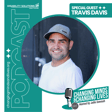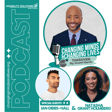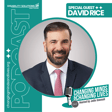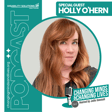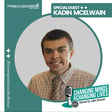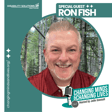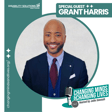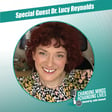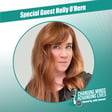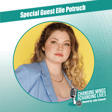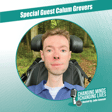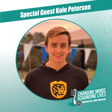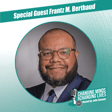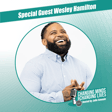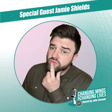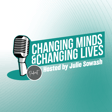Become a Creator today!Start creating today - Share your story with the world!
Start for free
00:00:00
00:00:01

Interview with Andrea Dalzell, The Seated Nurse
Julie sits down with Andrea Dalzell MSN-ED, RN, to discuss the limitations of the medical field for people with disabilities as well as the trials of interviewing for and landing a nursing position as a person with a disability.
Transcript
Introduction to Disability Solutions
00:00:00
Speaker
Welcome to Changing Minds and Changing Lives podcast. My name is Julie Sowash. I'm the executive director and co-founder of Disability Solutions. And as this is a pretty new podcast, I want to just welcome everyone. Thanks for taking some time to listen. And you know, Blake, just
00:00:17
Speaker
a little bit about me. I am a person who lives with multiple disabilities. They are all hidden disabilities. So unless I tell someone about them, they're unaware. And that's part of my story and part of my journey.
Podcast Goals and Guest Previews
00:00:32
Speaker
And what we're going to do on this podcast is talk with companies that work with disability solutions, my friends, influencers, and advocates from and for the disability community about the intricacies, the challenges,
00:00:48
Speaker
celebrate the wins in disability employment and break down and examine workplace trends, government policy biases, and so much more in an honest, no BS, very human way.
00:01:02
Speaker
change some minds and change some lives about true disability inclusion, get some more people to work in our community. We're going to have some amazing guests. One today is going to join us in just a minute. We're also going to have France Berthoud, who's going to join us to talk about the importance of inclusion in clinical trials and the work that he and I embarked on over the last
00:01:21
Speaker
year and a half on better inclusion for people with disabilities in clinical trials. Jamie Shields is going to join us very soon, founder of the Disabled Society and so many more.
Andrea Dalzell: Achievements and Advocacy
00:01:33
Speaker
However,
00:01:34
Speaker
Today, we are talking to Andrea Delzel, RN, MSN, founder and CEO of The Seated Position, 2021 New Mobility Magazine Person of the Year, the first recipient of the Craig H. Nelson Visionary Prize, a New York City Marathon finisher, and so much more. Andrea, welcome to Changing Minds and Changing Lives.
00:02:25
Speaker
Thank you so much for having me.
00:02:32
Speaker
Yes. It's so nice to have you here. Yes. So tell us, tell, tell our listeners a little bit more about you, not just the work stuff, but the like the Twitter bio. What, what makes Andrea tick other than marathons? Uh, the advocacy disability rights, knowing that I have gone through the wringer of being a person who has a very visible disability. I use a wheelchair.
00:02:59
Speaker
having a spinal cord injury, growing up in the concrete jungle, that is New York City, and navigating a world trying to accomplish what everyone says is impossible. And just for the chip to say that I did it, right? I think that's typical New Yorker. Let's just say that we did it.
00:03:25
Speaker
I think it's a lot more than you just did it now. You're doing such amazing work and I think that there's such a beautiful thing about taking your personal story and using it not just for your own good and your own chip but what we're seeing with the work that you're doing on the seated position and your writing and your advocacy to help
00:03:50
Speaker
employers understand the value of nurses with disabilities, the value of humans with disabilities.
Challenges in Nursing Education
00:03:57
Speaker
And, you know, so I want to start off kind of one of the things that drew us to engage with you and have you on this podcast was sort of your employment journey. Even though it's you've got a ton, a ton of amazing experience and kudos under your belt, you're pretty new.
00:04:18
Speaker
Um, new grad, you graduated from nursing school in 2018. Um, and so kind of tell me about what the finding a job after you graduated, uh, process was like for you. Well, I'm going to backtrack just, just a tad bit. Like anyone who knows my nursing educational part where I'm like getting into nursing school was already
00:04:46
Speaker
a plight. No one knew if I can do it. It was a question if I can get into clinicals. And then every semester there on fourth was always, and I don't know because it's new territory. You're charting. If I'm the first for New York state in that particular situation for that program, I'm navigating new territory. So every
00:05:05
Speaker
semester is new territory to navigate if I know or don't know. So yes, I make it through this educational part because I've navigated. I figured it out from a student level, how to be able to navigate clinicals, what nursing I want to be able to do. No one ever asked me during that point in time to be able to guide me afterward. Do you feel like that was something that was, they didn't ask you because it was
00:05:33
Speaker
that you had a disability or because that's not a part of nursing education. Give me a little insight. So it's not a part of nursing education. What nursing education is, is to get you to pass your nursing boards. And your nursing boards is to be able to get you to get into a hospital setting. It's bedside, direct care, acute care. But the nursing profession right now, as we know, has grown tremendously. We are in every part of integration that there could be and innovation.
00:06:03
Speaker
It's no longer just thinking about the hospital and the patient at the bedside. It's now thinking about your healthcare manager or your insurance coordinator. It's thinking about the person who's at the pharmacy coordinating your meds. It's thinking about the person who's coordinating your care at home or your child at a school. There's so many different aspects to nursing that we forget. So educational part is just to think about your average nurse leaving school and going to a hospital setting and taking care of acute care patients.
00:06:32
Speaker
And that's not just nursing anymore. We've expanded. So now thinking about someone coming in with a disability, I've navigated this space of education, which would be leading to clinical, which is hospital setting.
00:06:49
Speaker
not saying that I didn't want that. I very much wanted it because my goal was to become a nurse anesthesiologist nursing anesthetist. That's what I wanted to be. I was like, I'm going to go into ICU and then I'm going to go into OR and this is what I want to do. Not knowing how it would navigate that space, just waiting to pass my boards and then get into employment.
Employment Struggles and Breakthroughs
00:07:10
Speaker
Okay.
00:07:12
Speaker
Nursing, you said how many positions are open right now? So I looked this morning before we chatted, there are 350,000 open nursing jobs on our career center at Disability Solutions and I mean 350,000. That's pretty good job market for nurses, right? And when you pass your boards, it's national. You can go any state in America.
00:07:41
Speaker
and find a nursing job because that's, that's, you just apply for your license, you get it transferred, you can get a job. Okay. So I'm coming out of school and all of my friends are getting jobs. All of my peers are instantly getting jobs and here I am going to job
00:07:59
Speaker
after job interview, job interview, job interview. Cause here it is. The market is open. It is lush for us and I'm getting rejected. I'm going into the hospitals and I'm getting rejected automatically, not by face to face saying, Oh, we can't hire you because who's going to do that? Nobody's going to openly discriminate, but bias plays a part in how you interview, regardless if you acknowledge it or not. So me automatically rolling into a hospital setting where in hospitals,
00:08:27
Speaker
rolling in or rolling onto or being on something that rolls automatically equals disabled and unworking. Here I am being a functional disabled person, rolling into your office, asking for employment in a job that requires you to be hands on. Those two don't agree in anyone's brain because there's no representation of that in physical world. We're not seeing it. So therefore,
00:08:56
Speaker
Oh, sorry. Go ahead. I'm sorry. So therefore when I'm sitting through these interviews, I'm trying to make these one-on-one connections to be able to say, I did this in clinical practice in my nursing education. I've gotten through this. I've been able to navigate this. There's no connection there because all they're seeing is this disability that might hinder my ability to do something. So I'm curious as to how much more, at least in my perception,
00:09:26
Speaker
the bias would exist within the healthcare setting because of the way medicine approaches disability and quality of life and all of those things, right? We saw so much of that just gross dirty laundry get aired during COVID. I think that the world learned a lot. But when you're sitting there with
00:09:51
Speaker
a potential boss, a potential peer. In the healthcare setting, is your disability even more stigmatized because of the education that you received or that the healthcare industry receives?
00:10:05
Speaker
Well, of course, because we have stories now where during COVID or during that time of transition where COVID wasn't at its peak, but we were still hiring online and no longer bringing people into our facilities to do one-on-one hiring, look at the job spike in disability employment.
00:10:23
Speaker
Everybody was getting hired, including nurses with disabilities. And I can speak to this because if anybody goes online and she'd love me for tagging her, Ryan Mason, who is a nurse, she was an RN in the ED who has a disability and was able to get hired into a mother baby unit when before she was getting rejected from a clinical practice. Yeah.
00:10:45
Speaker
So, and it's the same thing for me. I didn't get hired into clinical practice until COVID hit New York at its peak. And hospitals were just scrambling to have anybody with nursing education in their facilities to be able to help. Really? Because the governor put out the call. It said, please for retired nurses to come out.
00:11:06
Speaker
of retirement. We needed the help. And that's when hospitals were putting out their literal HR numbers, asking them to send your resumes, send your credentials, and we would have you onboarded in less than 24 hours.
00:11:19
Speaker
And so that's how you got your first gig. Hi. Drea has made it in. I have got into the world. And think about it. I have a disability. I shouldn't even be running into COVID. I should be thinking about me and making sure that I'm protected. And here I am saying, well, I also need a job. I also have student loans to pay. I also have to figure this out because if I don't, then where do I fall into the statistical sense of life?
00:11:49
Speaker
Yeah. So there's that push and motivation, right? Yeah. And every minute you don't have a job is another minute that it makes it harder to get that first job. So you took the job at peak COVID in one of the New York hospitals or healthcare settings. Um, and, and tell me then,
00:12:10
Speaker
It had to be just such an unusual situation because everything was a hot mess. And so were you just kind of thrown into it and it was almost less of an issue that you had a disability because everything was chaos or did you still hit a lot of those same kind of usual barriers? I hit all the usual barriers as if I were the Tasmanian double just going around in circles.
00:12:37
Speaker
and IK do not, um, and this is no fault to anyone because once again, representation isn't there. So, you know, there is this very small expectation that someone with a physical disability is actually giving, giving, like they're actually being able to produce because there's no representation to pull from, even though there's so many of us doing it. And I get that.
00:13:04
Speaker
But the bias is thick. So even on my first night on the unit, I get asked, have I ever worked on a unit before? And let's just take a step back for one moment. I said, I have a disability. I didn't say what age. I had it since I was five. I stopped walking when I was 12. If anyone goes, and everyone does, goes through puberty, you know how hard that is to go through when you're in junior high school, middle school, whichever it is. These are when you learn your social skills, how vocal you're going to be.
00:13:32
Speaker
how much you're able to commit to society is going to be based on on these fraction of years. And this is when I was a rebel. So fast forward now. And here I am in this setting where I'm like, not only have I been a patient for my entire life, so I understand the chaos of what is happening here, because it is the chaos of what my life has been previously just as a patient. But yes, I've gotten through nursing school, I've proven that I can be a clinical standard and
00:14:00
Speaker
My outside knowledge of vent and how to do trait care actually helps a lot of nurses that have been in the field that are not vent nurses or trait nurses. And here I am as a new graduate knowledge. So you can actually utilize me where you need me. So as soon as they knew that, they threw me into the ICU. Oh, wow. So what you're saying is your lived experience has made you a better nurse and a better-
00:14:28
Speaker
a better peer, a better nurse, someone that's all around able to understand the chaos because I've lived it on the inside world. And that's something that a lot of people can't speak up. Let's think about those that have gone through some major medical issues in their life where they've been in and out of hospitals for some time. They understand the lingo because they start to hear what's happening around them all the time. Now I've done that my entire life from five years old.
00:14:55
Speaker
And here I am graduating from nursing school in 2018. I'm already in my 30s and I have understood the medical world at a level where most nurses have never. Right. Yeah. It's almost like you're coming home because you're so comfortable in that setting. Whereas everyone else has the sort of newbie worries and fears and lack of confidence. That's, I mean, I think that's a really good point is, you know,
00:15:23
Speaker
whether it's disability or any type of diversity is that we see so much impact on patient experiences, on customer experiences, whatever they are, when someone who has lived in your shoes is able to also serve or care for you in a way that no one else that I couldn't understand, that someone else who does not use a wheelchair wouldn't understand.
00:15:46
Speaker
And then let's let's step away from the personal for just a second. Yeah, every single business, I believe that employees over 50 people has to put on that they're an equal opportunity employer.
00:15:58
Speaker
and they do not discriminate based on sex, race, gender, disability, so on and so forth. What does that statement actually mean? We can't just be performative by putting it on because it's a federal law. But if I really wanted to, all of those interviews, I went through 76 interviews to land a clinical placement job at the peak of COVID. If I wanted to, even the ones that I had recorded because New York,
00:16:25
Speaker
is a single record state. I do not need to let somebody else know. And I had to record some of my interviews because I thought that I was doing something wrong. I thought that it was me. I thought that what I was saying or how I was conveying things was probably turning off nurse managers. So I recorded myself in an interview so that I can have a coach tell me if I was doing something wrong.
00:16:49
Speaker
And just trying to take that responsibility on me when I could have actually just said, you know what, you're discriminating against me. You're literally saying that I'm not capable because of the fact that I can't walk.
Bias in Healthcare Employment
00:17:06
Speaker
You asked me, how would I be able to do CPR? And this is a question that's raised in the nursing community in general. How are you able to do CPR from the seated position? How could you run to do a code? How could you push a gurney down?
00:17:19
Speaker
down a hall. Well, I asked that for a nurse who broke her wrist. I asked that for a nurse who may be having hypertensive issues or someone who's diabetic who's not under control but can work a unit still. You don't know those invisible disabilities. What if someone has severe anxiety and you don't know when that anxiety is triggered, but you're questioning my disability because it's visible. Because you can see it. Yep. Yeah. I mean, 100%.
00:17:50
Speaker
So you don't exclude them either. Go ahead. I'm sorry. It doesn't exclude them for questioning someone's invisible in disability that's been forthcoming. You know, it's just, they get to do it for me right off of the bat. So I can't even get my foot in the door. There's a lot of assumptions that go along with it, right? I mean, when I first started disclosing my mental illness, you could see everybody's face going like, she's either faking it.
00:18:15
Speaker
or she might kill us. Like there was that wide range of assumptions that happen. And fortunately, I'm in a place where I get a different, I have the ability to tell that story and you are there now, but it took that time. It took that person who finally in the midst of COVID said, yeah, we need to get this woman on the floor and get her to work because we need bodies. You know, and
00:18:43
Speaker
sort of my expertise, my background is really in the systems and the processes that create inequity around the hiring process and all of those things. And I just find it interesting and remarkable that you took the time to say, you know, maybe this is me, maybe I need to get an interview coach, maybe I need to make sure
00:19:07
Speaker
And as talent acquisition people, recruitment people, HR people, I think a lot of times we lose the human side of what we do. And so stories like yours and your willingness to share the personal side and the professional side help remind people in TA that we're not just pushing buttons, we're not just
00:19:28
Speaker
you know, making workflow decisions, like we are changing people's lives when they get that job, especially people who are going to have extra barriers to employment, like people with disabilities. So I thank you for sharing that. And, you know, I guess I would be curious, just, you know, what would be some of your advice
00:19:52
Speaker
to a new grad or even an experienced nurse with a disability who is looking for that next part of their career arc. What are some of the lessons that you learn, mistakes best practice into actually sort of finally getting into a role? These are two very different questions. I tend to do that. For the new grad, my advice is
00:20:24
Speaker
Don't let anyone gaslight you into thinking that you don't belong. You very much have gone through this. You have very much proven yourself. You've passed your boards. You were here. You belong. Period. Don't let anyone tell you what direction you should be in or where it's best or easy for you. You already know the answer to that. You went through your clinicals. So find a home. Start small. You don't have to start big and find people that you can work around.
00:20:53
Speaker
even if that means reaching out on Facebook or LinkedIn first, we're out there. They're more than willing nurses always wanting to hire. You just have to think smaller rather than bigger sometimes. That's to the new grad. Then to the person who has a disability in nursing, who's probably been my veteran nurse, who's probably the new nurse that something has happened, they've been injured on the job, they don't know what's going on, life is changing. The best thing about having
00:21:24
Speaker
our end behind our name is the fact that we can go anywhere and do anything. And you have to believe that. I'm sorry that you are having a career shift, but maybe this is beneficial. And I think that we owe it to the profession and we owe it to ourselves to show people that it's not just about being bedside care nurses anymore, that our care extends beyond what people
00:21:52
Speaker
can think and imagine right now and the fact that the internet is so connected, it gives you some leeway and stop thinking so in the box.
00:22:02
Speaker
Yeah, I love that. I mean, you, you gave me something completely different to think about earlier when you said like, we know we aren't just bedside care nurses anymore. They're the world is huge. The world is is there are so many more opportunities than than what existed before. Yeah. And before we kind of go to our closing questions, I had one more question I wanted to just ask you about the notice of proposed rulemaking that came out, I think, three weeks ago, about the need for
00:22:31
Speaker
enforcement around access to accessible diagnostic equipment.
Advocating for Accessible Healthcare
00:22:38
Speaker
And as both a health care professional who needs to know how much someone weighs, how to get a proper exam, all of those things, and also as a patient with a disability, talk a little bit about the importance of the federal government coming in to finally start looking at some
00:22:59
Speaker
equitable and accessible justice for healthcare for our community. I think it's about time at explicit. I think it's about time. I think, you know, the ADA was signed over 30 years ago and let's think about that. That's just 1990. And this is supposed to make sure that there's accessibility wherever there's federal dollars. The fact that healthcare systems today in 2024
00:23:28
Speaker
We're in February already of 2024. And we are now seeing the federal government say, you know what? We're going to enforce and make sure that there's accessible equipment. Let's not just think about someone who is unable to walk or unable to stand. Let's think about someone who may be overweight and we're shaming them. They can't get into a CT scanner or an MRI scanner. So now their diagnoses are pushed out longer. It's like, when do we say enough is enough?
00:23:57
Speaker
And when do we as healthcare providers hold ourselves accountable for making sure that these things actually happen? So now that the federal government is stepping in and saying, you know what? Our federal dollars are supposed to be allocated to this. Let's make sure that this is actually happening. Yes. That makes sense to me. It makes sense, but let's just make sure that it can actually pass and let's make sure that that enforcement actually goes through and that we're actually holding these industries accountable.
00:24:25
Speaker
And I know that industries don't necessarily want to hear that. I become the bad guy when I say that, but let's also be real. When you allow for these doors to open and you, you're not just closing off to this small community anymore.
00:24:39
Speaker
you're opening the door for more and more people to utilize their services because now you're becoming exclusive to their care, inclusive to their care, sorry. Yes. And you're becoming inclusive to their care. So, I mean, that just to me makes sense. You're spending money right now to make money in the long run because more and more people are going to be able to access these services.
00:24:58
Speaker
Yeah, it's a good business decision. And I swear we'll probably be saying that until we let the next generation of advocates come on the floor for us. But these are incredibly important strides and long overdue.
00:25:13
Speaker
I'll take the wins we can get and we'll keep pushing. So two last questions.
Value of Employees with Disabilities
00:25:19
Speaker
You are my first victim of my standard questions. So first question, and only one this time, it is what is one thing that you would tell a hiring manager, a people leader, a healthcare administrator that would change their minds about the talent value of people with disabilities in their workplace?
00:25:42
Speaker
Oh my gosh. You say that you want people who are not lazy and want to work. Disabled people will be that person. They will not call out because they are so ashamed that the moment that they call out of work, that you think that they're less or not worth it because of the fact that their disability played a part there.
00:26:07
Speaker
I'm telling you, they will think twice before calling out because they are so upset with themselves because of that internalized ableism. They want the job, and I'm putting people out there right now because we are shameful when we call out. We don't want to call out. It is a part of this ingrained ableism.
00:26:26
Speaker
So managers, I'm telling you right now, you talk about people with disabilities not like possibly not showing up or calling out too much. They're the ones that are going to be thinking twice before they call out and they're probably going to be the most productive person on your team. I love that. I love the super bluntness of it too. Don't meet around the bush, just say it. Second question. What is one action or story or event that's happened in your life that helped change your life?
00:26:55
Speaker
as a person with a disability?
Impactful Patient Encounter
00:26:59
Speaker
When I was in nursing school, I didn't know if I was going to stay. I was actually contemplating dropping out. I was so bogged down by trying to prove that I can do it. And I was helping a peer out. There was a patient at clinical practice that was giving nurses a hard time. She didn't want to get up. She didn't want to go PT.
00:27:25
Speaker
had a, she was newly diagnosed stroke. So she was paralyzed on one side of her body. And my peer was just asking for help because we just need to get a report done so that we can hand it into our professor. So all we're thinking about is getting things done. So I go into the office, I go into the patient's room to help her. And this patient looks at me, roll into her room and starts sobbing, crying.
00:27:51
Speaker
like booing and I'm thinking something's wrong at this point. Maybe that's why she didn't want to get up, get the nurse, call our instructor. And I just roll right up to the bed and I start putting on the blood pressure cuff to at least get like some vitals. And she looks at me and she says, I thought my life was over. I'll never forget the words. And I said, I don't know what you mean. Life is only over. If you stay in this bed, you got to tell me what's wrong. And
00:28:19
Speaker
She said she'd never saw a nurse in a chair, basically. So she thought life was over with her new diagnosis. I knew what she meant in that moment, but I didn't play into it. But I felt in that moment that I was reassured that I was right where I was supposed to be and that I wasn't supposed to give up. And here we are. Six years later, I've been a nurse now six years, and I'm exactly where I'm supposed to be. So that is incredible. You changed your life.
00:28:49
Speaker
And she changed her life at the same time and put you on this mission that you're on today. That's amazing. So Andrea Delzel, how do we find you? Have Twitter, LinkedIn, Instagram, give us the date. Yeah. So I am known as the seated nurse and you can find me at that hashtag at symbol on all of the platforms at the seated nurse.
00:29:17
Speaker
or you can go on to atthesedednurse.com and find me there. Great. Andrea Dalzell, thank you so much for joining us today. Thank you for joining us on this episode of Changing Minds and Changing Lives. Subscribe, follow us on Instagram, TikTok, all of the places, and tell me who we should be talking to to change minds and change lives together for true disability and inclusion. Until next time.
